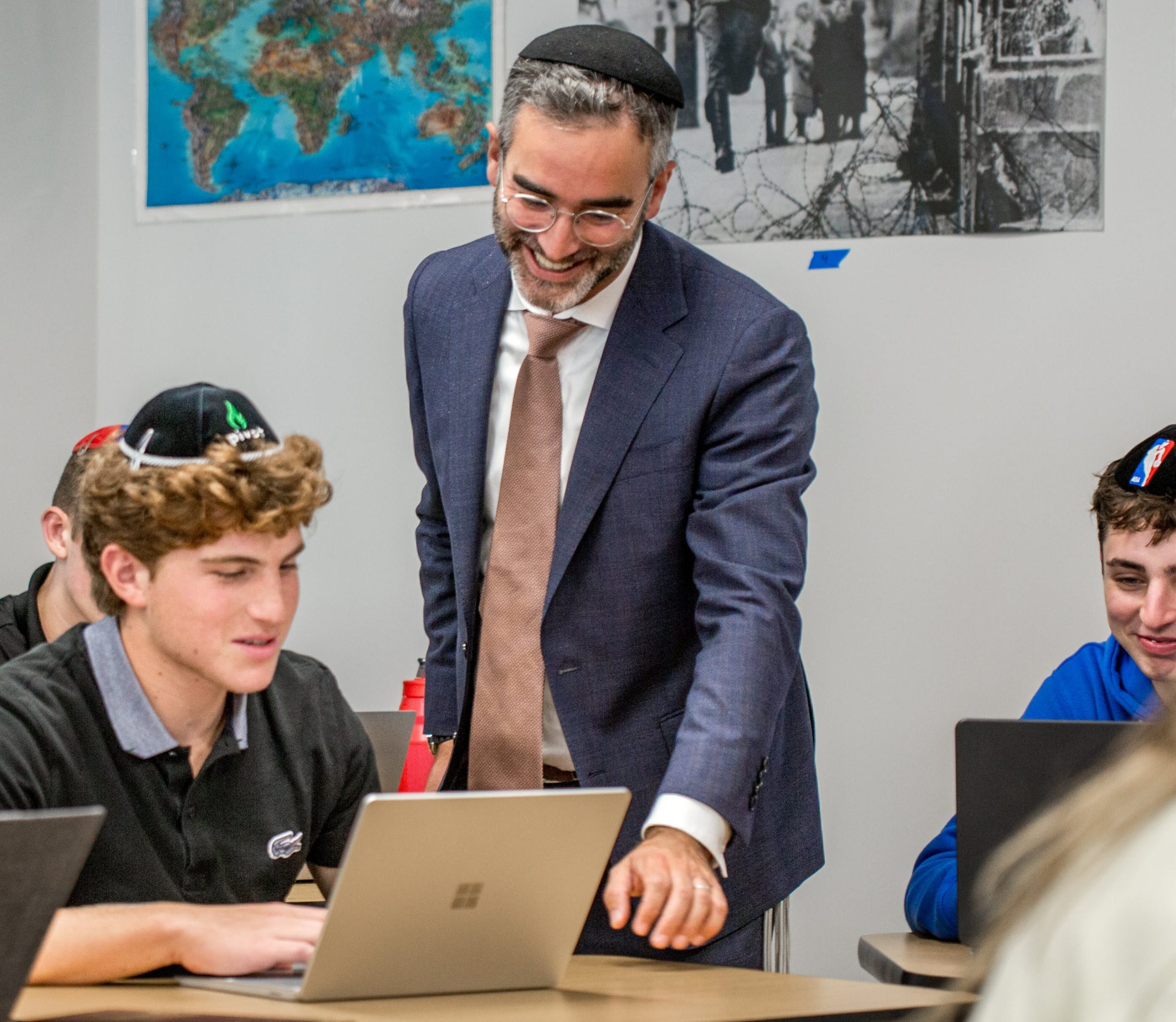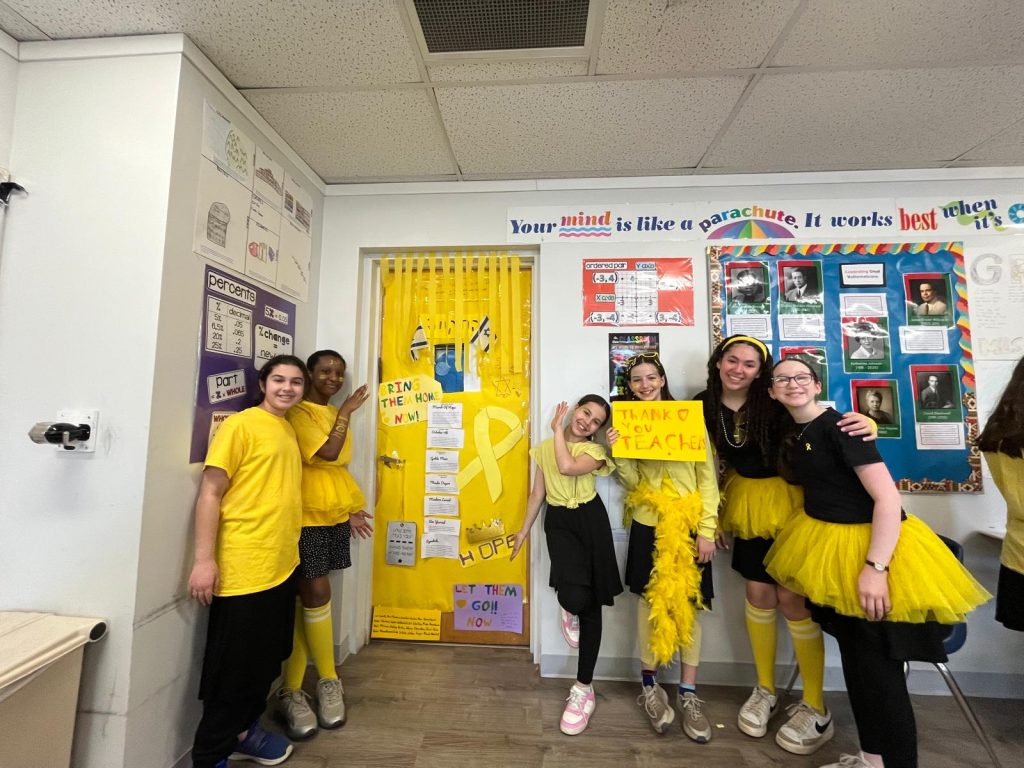
In my last piece, I shared about the inconclusive research findings associated with banning student phones at school and the outcomes of academic achievement and positive mental health and well-being. I argued that we shouldn’t treat these devices as a singular crisis, because social, cultural, and contextual factors all strongly affect how students do scholastically and personally, and also are inextricably linked with how exactly they use their phones. Today, I wanted to share a conversation I recently had with Rabbi Dr. Hillel Broder, who serves as Head of School at Melvin J. Berman Hebrew Academy in Rockville, Maryland. Let’s dive right in!
Rabbi Dr. Broder, you and I have worked together for about 1.5 years now, and we’ve had multiple conversations on student device use at school. Over the last year, you’ve implemented a Wait Past 8th Initiative, and I think enough time has passed to have a meaningful conversation about lessons learned.
What is Wait Past 8th? Did you come up with it? (I realize you didn’t but just tell the audience how you came across the idea)….
Wait Past 8th is a school-wide campaign for our K-8 parents to pledge that they will wait until 9th grade before purchasing their children a smartphone. This campaign was an adaptation of the national “Wait Until 8th” pledge, and was inspired by Jonathan Haidt’s four norms to “free the anxious generation”, one of which is waiting until high school before giving a child a smartphone. I’m proud to say that more than 50% of all parents of K-8 students have pledged to wait past 8th!
Can you please explain what prompted the consideration and implementation of this initiative?
The transition from Lower School to Middle School seemed to center around a tremendous amount of peer and parent pressure to purchase smartphones for their child. In our school, that means that 5th grade students were telling their parents that all of their peers were purchasing smartphones as rising 6th graders. The transition meetings and Middle School orientations were plagued with questions about the school’s position on smartphones and social media, with parents assessing the “norms” in our community through limited networks. It was clear, then, that we could play a role, along with our parent partners, in generating a new norm and counternarrative in our school. This would also counter peer pressure if our community got on board that children wait until high school to get a smartphone.
What does implementation look like at the middle school level? Upper school level?
Per Jonathan Haidt’s four norms, we introduced the concept of going phone-free first via a book study of Haidt’s Anxious Generation, and then a roll-out this past July of a vision for a phone-free school. What that looks like at the Berman Hebrew Academy is a daily phone collection at the start of the day for students across 6th through 11th grades, with students leaving their phones in mobile phone lockers before the first period, and collecting their phones after the bell of the last period. Our 12th grade students, who have “senior privileges” (for example, they can drive to campus, leave campus in the middle of the day, etc.) were asked to keep their phones out of sight and mind.

What are the consequences for violations?
If students do not deposit phones, a note goes home and the student’s “citizenship” grade (a grade on their report card) is affected, with rising consequences for each violation (1st time = 1 point deducted; 2nd time = 2 points; 3rd time = 5 points). Phones that are seen between arrival and dismissal will be confiscated for 24 hours and stay in a safe in the Head of School’s office.
Here’s how this is written in our policies:
Consequences are earned when…
- A student neglects to turn in their phone upon arrival
- A student turns in a fake/old phone
- A student is seen with their phone in the building, at any point when school is in session
In the above scenarios, parents will be contacted and…
- 1st Incident: Phone is taken for 24 hours** (1 point deducted from Citizenship Grade)
- 2nd Incident: Phone is taken for 2 days** (another 2 points deducted from Citizenship Grade)
- 3rd Incident: Parent conference and 1 day out-of-school suspension (another 5 points deducted from Citizenship Grade)
**Anytime a phone is taken overnight it will be locked, safely, in Rabbi Broder’s office.
What were some difficulties – expected or unexpected – that you encountered on campus after the new policy went live?
Students were upset by the policy. Parents were mostly bought in, but those who did not come in raised concerns about access to their children throughout the day, and especially in the event of an emergency. Depositing and returning phones by students also caused certain bottlenecks throughout the building.
Did you receive any pushback from teachers, or were they 100% in support the policy? How about from parents and guardians? How about from students?
See above. Teachers were 100% supportive, though some were skeptical about the success of the program, and others were concerned that they might need to have a way to access students throughout special programming (off-sites, for example) or might need to use phones’ apps for class projects.
I understand that at the beginning of the school year, you set the tone through an orientation or formal presentation to the entire student body. Can you explain what you cover?

I started my opening presentation on this policy with a set of Jewish values and practices–everything from interpersonal behaviors that we cultivate, such as respect and privacy, to intrapersonal behaviors that we teach, such as health, modesty, and spiritual rest. I then shared research on negative academic and social outcomes due to the distractions of smartphones and social media. And then we got into the actual policy and its enforcement.
How did you win over the upper schoolers? I presume they were a really tough crowd?
We started with some buy-in from upper school leaders, which really helped. We briefed the Student Council on the why, and they all understood and agreed that a phone-free school might positively affect and grow our school community. We then promised to solicit feedback on a quarterly basis, and so far, on a scale of 1-5, our Upper School students are evenly divided on their impressions and experience of the program, with an equal number of detractors and promoters of the program. That, for me, is both unexpected and some serious progress.
How many phones did you confiscate early on for violations of your new policy? Now, I presume you rarely need to confiscate? Can you explain how things are going?
Early on, it was really just the seniors’ phones, as they were not turning in their phones and generally weren’t accustomed to such self-monitoring and self-control. I would say it was probably about 1-2 per week in the first quarter of the year. At this point (March 2025), that number has really dropped off, as the seniors have truly stepped up as young adults and good role models for the rest of the student body.
You’ve collected quantitative and qualitative data that speaks to the value of this policy at school. Can you share some of the findings?
Sure. Students are the toughest critics, understandably. However, more than 1/3 of surveyed Upper School students are satisfied with the program, 25% believe that they have been better students because of the program, and 34% believe that they have had improved socialization due to the program.
More than 50% of parents believe the program has improved their child’s experience of school. 80% are either satisfied or very satisfied with the program. The greatest parent concern continues to be accessibility to students in the middle of the day, and usually for low-level concerns.
And teachers are the greatest supporters, with many sharing how their classrooms have changed, how the students’ experiences at lunch have changed, and with one teacher sharing how school now looks like it did “in the 90s.” An overwhelming 95% of teachers surveyed shared that the policy has changed their experience of teaching, and 86% of of teachers shared that the policy hsa made it easier to engage with students.
Have you had to make any adjustments to the policy – or its enforcement – along the way?
While enforcement has been consistent, we’ve had to adjust how we return phones, as managing the traffic and related bottle-necks on campus has been a challenge.

I presume you are going to keep this up going into the new school year and beyond? Would you consider this a home run?
Yes, we will continue. We may have to revisit the situation for upper division students, including seniors, as there were some concerns early on about their phone use during the day.
Do you feel that more administrators want to do this, but simply are fearful of taking the first step? What is their hesitation, and was it also your hesitation?
Great question. I definitely think school administrators want to and are moving in this direction, and the fear and necessary first-step is mostly buy-in from all necessary parties. Ultimately, you won’t get buy-in from the majority of your students, but you can make the case and get enough buy-in from student leaders, which will help normalize the implementation.
Do you have any specific advice based on your experience for other schools struggling with distracted students and phone overuse?
As educators, it is our shared responsibility–along with parent partners–to create a healthy social-emotional, spiritual/religious/psychological, and academic environment. Going phone-free is an important first-step to help our students build positive relationships, create meaningful and spiritual lives, and guard their mental health.
Anything else you’d like to add?
Thank you for this opportunity to share our experience so far as a phone-free pilot school. I’m more than happy to share our experience and any other resources with any other schools out there. Please just email me at [email protected].







